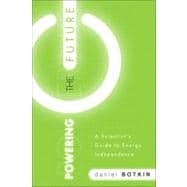
Note: Supplemental materials are not guaranteed with Rental or Used book purchases.
Purchase Benefits
What is included with this book?
Daniel B. Botkin is Professor (Emeritus), Department of Ecology, Evolution and Marine Biology, University of California, Santa Barbara, and President, The Center for The Study of The Environment, a nonprofit corporation that provides independent, science-based analyses of complex environmental issues. The New York Times has called him “one of the world’s leading environmental researchers,” who has “done much to popularize the concept of using yet maintaining the world’s natural resources.”
His research includes creating the first successful computer simulation in ecology; studies of wilderness and natural parks ecosystems--from the Serengeti Plains of Africa to the Boundary Waters Canoe Area of Minnesota and Isle Royale National Park; threatened and endangered species--whooping cranes, salmon, bowhead and sperm whales, and African elephants. He was among the first to investigate possible ecological effects of global warming and to help NASA use satellite imaging to study the Earth’s global environment.
His dozen books include Discordant Harmonies: A New Ecology for the 21st Century, which “is considered by many ecologists to be the classic text of the [environmental] movement,” according to the New York Times. Beyond the Stony Mountains describes nature in the American West before European settlement, based on the journals of Lewis and Clark. No Man’s Garden analyzes the value of nature and the relationship between people and nature. He has published op-ed pieces in many major newspapers concerning global warming, biological diversity, and energy, and more than 150 scientific papers.
His recent awards include the Astor Annual Lectureship for 2007 (Oxford University); annual distinguished visiting scholar for 2008 (Green Mountain College, Vermont); and the Long Beach Aquarium, Long Beach, California, has appointed him its first-ever distinguished visiting scientist for November 2008. He is also the recipient of the Fernow Award for Outstanding Contributions in International Forestry and the winner of the Mitchell International Prize for Sustainable Development.
His other academic appointments include Professor of Biology and Director of The Program in Global Change at George Mason University, Fairfax, VA; Professor of Systems Ecology at the Yale School of Forestry and Environmental Studies; and Research Scientist, The Ecosystems Center, Woods Hole, MA. His degrees are B.A. (Physics; University of Rochester), M.A. (Literature, University of Wisconsin), and Ph.D. (Biology, Rutgers University).
Acknowledgments xiii
About the Author xv
Preface xvii
Introduction: Blackout 1
Section I: Conventional Energy Sources 15
Chapter 1 Oil 19
Chapter 2 Natural Gas 37
Chapter 3 Coal 51
Chapter 4 Water Power 73
Chapter 5 Nuclear Power 85
Section II: New Energy Sources 115
Chapter 6 Wind Power 119
Chapter 7 Solar Power 141
Chapter 8 Ocean Power 163
Chapter 9 Biofuels 173
Section III: Designing an Energy System 197
Chapter 10 Transporting Energy: the Grid, Hydrogen, Batteries, and More 199
Chapter 11 Transporting Things 211
Chapter 12 Saving Energy at Home and Finding Energy at Your Feet 227
Chapter 13 Solutions 245
Endnotes 279
Index 313
The New copy of this book will include any supplemental materials advertised. Please check the title of the book to determine if it should include any access cards, study guides, lab manuals, CDs, etc.
The Used, Rental and eBook copies of this book are not guaranteed to include any supplemental materials. Typically, only the book itself is included. This is true even if the title states it includes any access cards, study guides, lab manuals, CDs, etc.